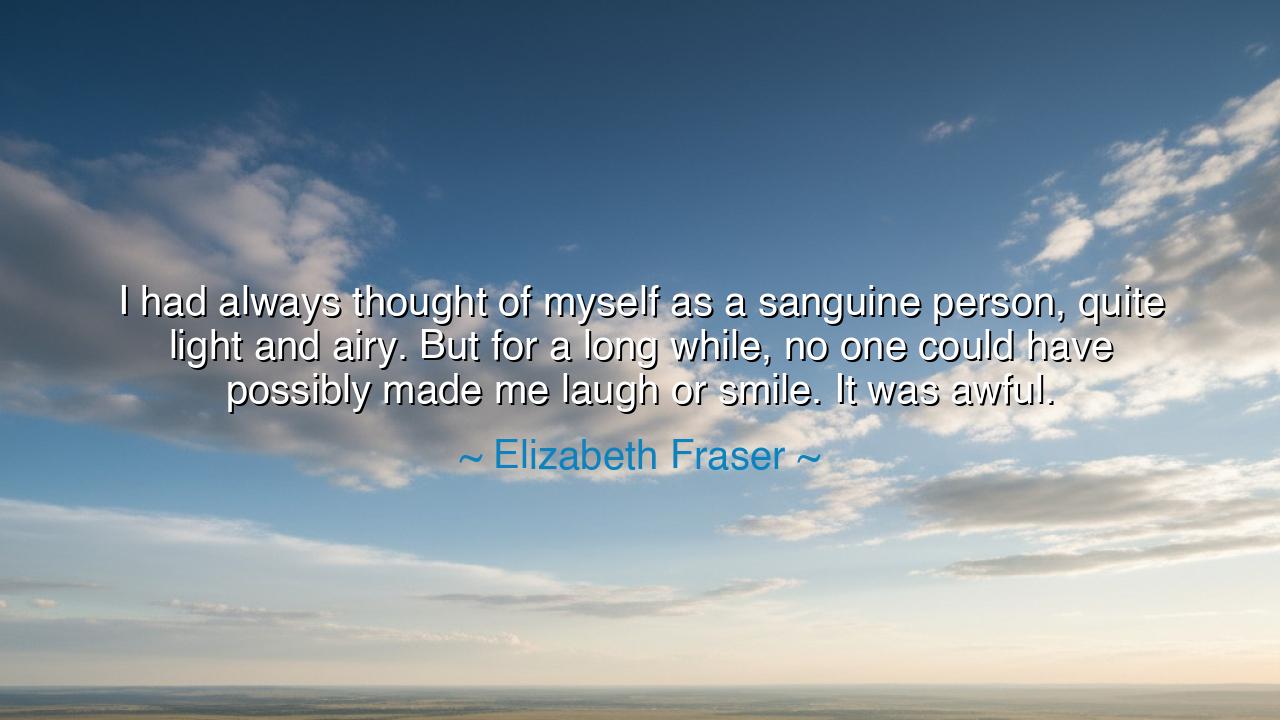
I had always thought of myself as a sanguine person, quite light
I had always thought of myself as a sanguine person, quite light and airy. But for a long while, no one could have possibly made me laugh or smile. It was awful.






Listen well, O seeker of wisdom, to the words of Elizabeth Fraser: “I had always thought of myself as a sanguine person, quite light and airy. But for a long while, no one could have possibly made me laugh or smile. It was awful.” Herein lies a meditation upon the human spirit, a journey from the brightness of natural joy to the shadows of despair, and the eventual rediscovery of lightness and connection. It is a reminder that even the most radiant souls may wander through darkness, and that the passage through sorrow can teach truths as profound as the heights of happiness.
Long before our era, the philosophers and physicians of ancient Greece contemplated the humors, seeking to understand the temperament of man. The sanguine, they said, was cheerful, lively, and social, quick to laugh and share delight. Yet even these spirits were not immune to the trials of life, for the world, in its caprice, can impose grief, disappointment, or isolation that stills the heart’s laughter. Fraser’s words echo this ancient understanding: the nature of joy may lie dormant, but it is not destroyed; it awaits the careful tending of the soul to awaken once more.
Consider the tale of King David, whose psalms reveal a heart both elated and sorrowful. Though chosen to rule, he endured betrayals, losses, and moments of profound despair that robbed him of the natural lightness of spirit he once possessed. Yet through meditation, prayer, and music, he found the capacity to smile again, to compose songs that would bring solace not only to himself but to generations that followed. Fraser’s reflection mirrors this timeless truth: even in a period where laughter seems impossible, there remains hope for renewal.
There is an emotional heroism in this acknowledgment of darkness. To admit that the usual brightness of one’s character has been eclipsed is not weakness but honesty, a courage akin to stepping into the arena of one’s own soul and confronting the shadows. The ancients understood this confrontation as the beginning of wisdom: only by seeing the absence of joy can one recognize its value, and only through the acknowledgment of despair can one prepare to embrace the return of light.
History offers other exemplars of this phenomenon. The poet Emily Dickinson, though often isolated and shrouded in melancholy, created verses that shimmered with delicate humor and vivid imagination. Though laughter eluded her in many moments, the cultivation of expression, reflection, and small joys eventually allowed her internal world to glow again, if quietly, for those who would come to read her words. Fraser’s words remind us that even when the outward world seems incapable of evoking a smile, the inner light can be tended, nourished, and restored.
The lesson is clear: the ebbs of human emotion are not to be shunned or feared, but honored. When laughter and lightness vanish, it is not a permanent eclipse but a season of the spirit. One may seek solace in creativity, in connection, in ritual, or in the simple attentions that nurture the soul. The ancients would counsel patience and gentleness with oneself, recognizing that the return of joy is often gradual, arriving in whispers before it bursts into song.
Thus, let each heart bear this teaching: the presence of darkness is not the end of light, nor is the loss of laughter a permanent fate. Like the seasons, the spirit waxes and wanes, and the capacity to smile can be reclaimed through intention, reflection, and openness to the world around us. Elizabeth Fraser’s candor serves as both warning and guidance: we must honor our sadness, yet we must also nurture the possibility of renewed brightness, for even the most radiant spirits may need tending.
Finally, take practical counsel: when the world feels heavy, allow yourself small acts of joy—listen to music that stirs the heart, speak with those who uplift, write or create to release the weight within. Seek the moments that invite laughter, however fleeting, and guard them as precious. Through such deliberate care, the sanguine nature, the light and airy spirit, may return, stronger and wiser, prepared to illuminate not only one’s own life but the lives of those who cross your path. In this, the ancient truth resounds: even from despair springs the enduring possibility of joy.






AAdministratorAdministrator
Welcome, honored guests. Please leave a comment, we will respond soon